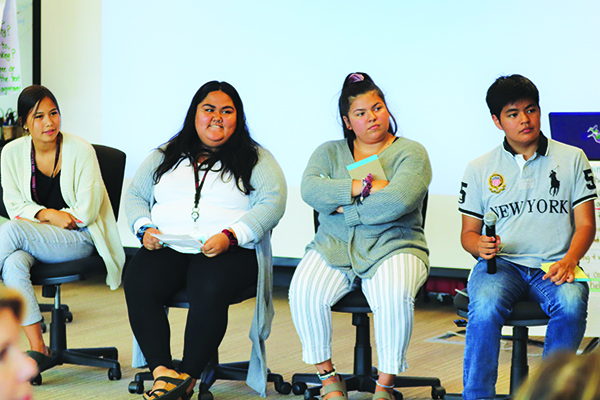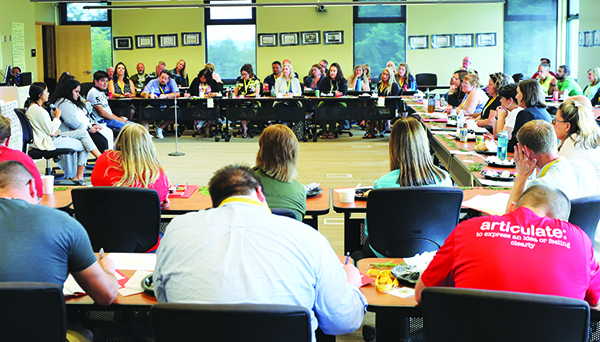
By Micheal Rios, Tulalip News
In early August, over fifty Marysville School District administrators toured their neighboring reservation to receive an enriching glimpse into Tulalip culture and lifeways. Among the group included every principal and assistant principal in the District. The highlight of their day-long venture was a powerful face-to-face sit down with four thriving Tulalip Youth Councilmembers.
Treasurer Marisa Joseph,12th grader at Marysville Pilchuck, social media coordinator Evelyn Vega-Simpson, MP junior, secretary Shylah Zackuse, 10th grader at MP, and chairman Kaiser Moses, Marysville Getchell junior, each shared details of their unique experiences as young culture bearers and excelling students of the public school system.
They sat front and center while speaking their truths in response to a series of questions their school administrators asked them. Between the four inspiring, high-achieving students are multiple honors classes, instruments played, languages spoken, and an overwhelming desire to be seen for their well-earned accolades that break commonly held stereotypes of Native American youth. The following is an edited transcript of that Q&A.
Q: What are three awesome facts about yourself?
Kaiser: “The fact I’m able to live so close to the Tulalip longhouse, be able to actively participate in my culture through traditional gatherings, and I enjoy hosting and traveling to powwows.”
Shylah: “I’m Indigenous. Half my school classes are either A.P. or honors level. I’m really good at multitasking.”
Evelyn: “I’m able to play five instruments, I’m fluent in three languages, and I am an advocate for other kids who do not have a voice.”
Marisa: “I’m Indigenous. I participate in my culture and love my culture. My cumulative G.P.A. is 3.96 and my goal is to go to Harvard and study law so I can represent Native people on the federal level.”
Q: What do you love learning about?
Marisa: “History, especially Native American history. However, in my U.S. History class this past year we only spent a brief part of one week where we watched a video about Native Americans. I think we can improve upon that and definitely spend more time learning an accurate Native history.”
Kaiser: “I love learning about our traditional longhouse history. It’s really easy to go over and talk to a bunch of elders and learn from them, so you all here can incorporate their teachings into the school curriculum.”
Shylah: “I love learning about my culture. This summer I participated in Canoe Journey and have been learning my traditional language, Lushootseed. I’ve learned how to formally introduce myself and look forward to becoming fluent in Lushootseed so I can teach my future children.”
Q: What do you most look forward to this school year?
Evelyn: “Band. I’ve been playing instruments since I can remember. Music is a big part of my life and obviously my culture as well. I’m also taking Running Start classes right now during the summer and look forward to continuing to take college classes during the school year.”
Kaiser: “My mom says when you go to school you’re building a bridge to society. We get teachings from school and teachings from the longhouse. I’m excited to develop that bridge even more so it’s easier to navigate back and forth.”

Q: What is something you wish your teachers knew about you?
Shylah: “I want my history teacher to know the history of my ancestors. When we’re in the classroom they don’t teach about the genocide of Native Americans or the boarding schools our ancestors were forced to attend. My ancestors weren’t allowed to be Native American. They couldn’t speak their language or practice their dances and songs. My history teachers should know this.”
Marisa: “I want my school teachers and peers to be educated about our culture, traditions, and way of life. If they knew what our ancestors went through, then they’d have a better understanding of our daily lives and what we go through as Native people today.”
Evelyn: “The Tulalip Tribes donates a lot of money to the school district. I know that can be a touchy subject, but I’d like to see a public ‘thank you’ from the Marysville School District. The money the Tribes donates helps not just Native students, but all the students.”
Q: What is the importance and role of education in your life?
Evelyn: “Education has always been a top priority in my life. I grew up in Snohomish with a wonderful pair of foster parents. They taught me to embrace music and to love school because they can take me so far in life. I dream of attending Oxford to become a surgeon. I have a high G.P.A. and plan on getting my Associates Degree as a high school student. Those things shock people because I’m Native, but I’m not a stereotype. I am better than any stereotype and will always be better.”
Marisa: “I’ve always taken my education serious and put it first always. I’ve sacrificed a lot of time with my friends in order to study and get good grades. My goal is to attend an Ivy League. I will be successful and not let myself be a statistic.”
Shylah: “I come from stereotypes. The stereotypes I come from are we don’t graduate, we’re drug addicts and alcoholics, and we’re teen moms. Well, I’m none of those. I get good grades, I’m not a drug addict, and I’m not a teen mom. I come from a drug addict dad and a single mom. My mom is going to college now with four kids and a fulltime job to prove to her kids we can go to college, too. Through my education I will go to college and have a successful career.”